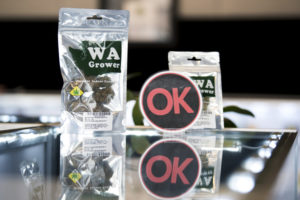Main Street Marijuana joins voluntary industry testing program

Recent customers at Main Street Marijuana in Vancouver’s Uptown Village neighborhood have likely noticed a new set of signs prominently displayed in some of the store’s display cases. They’re hard to miss: a giant red OK logo on a black background.
The signs come from an industry-led program called OK Cannabis, which offers testing services to detect pesticides and heavy metals in cannabis end products — the type of fully processed and packaged goods that consumers will find on store shelves.
Retailers say the program is intended in part to educate consumers about what they characterize as a gap in Washington’s regulatory framework: the state doesn’t require recreational marijuana products to be tested for pesticides.
Big sellers participate
The OK Cannabis program is still in its infancy, with only four merchants participating so far. Main Street is the first Southwest Washington retailer to enroll.
But the participating stores are among the biggest in the state by sales volume; Main Street is ranked first, and Evergreen Market, Uncle Ike’s and Green2Go are all in the top 10. Program founder Ian Eisenberg says ideally he’d like to see every dispensary in the state sign up.
“Not many stores care (about pesticide testing), to be honest, and it’s unfortunate,” he says. “Some vendors really want to get tested, and some not so much.”
Dispensaries pay a flat $1,000 monthly rate to sign up (plus another $500 for each additional location they operate) and provide OK Cannabis with an up-to-date list of all the products on their shelves.
Once per month, OK Cannabis randomly selects a few products from the inventory for testing. A third-party service picks up the products and delivers them to a contracted testing facility, Redmond-based Confidence Analytics. The results are published on the OK Cannabis website.
If a product fails testing, the participating retailers are obligated to pull it from store shelves, offer refunds to customers and either switch suppliers or work with their existing suppliers to find the source of the contamination and fix it.
Eisenberg owns the Uncle Ike’s dispensary stores in the Seattle area, and he says the idea for the program grew out of his efforts to make sure its products were free of contaminants. Uncle Ike’s began having its products tested soon after it opened four years ago, he says, and the initial results weren’t promising, with a failure rate of 30-40 percent.
“Pretty much everything tested positive for pesticides,” he says.
The results improved over time as the store began working with its suppliers, and the staff eventually decided to expand the program beyond its own stores, renaming it OK Cannabis. They started reaching out to try to recruit other retailers about seven months ago.
Main Street enrolled in May, and its first round of products passed the tests, co-owner Adam Hamide says, but the existence of the program is still prompting growers to improve their practices to make sure they continue to pass.
“We’ve seen multiple vendors change their procedures based on this program already,” Hamide says. “It’s changing the way people are doing things, on a producer-processor level.”
The administrative side of the program is handled by Eisenberg and other staff from Uncle Ike’s under a separate corporate entity, but Eisenberg says he eventually hopes to spin it off into a nonprofit once more stores come on board.
Regulatory gap
There’s definitely a marketing angle to the program — dispensaries that pass the test are given large OK Cannabis signs that they can add to the display shelves for the tested products, and Hamide says the program serves as a selling point for Main Street, since it’s the only enrolled store in the region.
But Hamide and Eisenberg say the program also helps educate consumers by highlighting a gap in the way Washington regulates the burgeoning cannabis industry and tests its consumer products.
“There are certain things they do test for — mold and moisture content, those things are getting tested by all growers,” Hamide says. “But what’s not getting tested is heavy metals and pesticides.”
Washington does have established standards for acceptable levels of pesticides and other contaminants — referred to as action levels — but the state Liquor and Cannabis Board’s testing process is currently triggered by complaints, at least when it comes to recreational products.
“On the medical side, there are additional tests for pesticides, etc.,” said Liquor and Cannabis Board Communications Director Brian Smith.
That could change as early as next year, Smith said — the agency plans to expand the scope of its testing program, and an internal workgroup is currently studying how to do so without overwhelming retailers.
But in the meantime, most recreational products go untested, and Eisenberg and Hamide say consumers probably aren’t aware of the specific regulations for testing.
“I think a lot of people probably believe (the products) are being tested for pesticides,” Hamide says.
Eisenberg knows state regulators are working on testing, but he says there will still be room for a program like OK Cannabis, especially if the state’s expanded testing program focuses on producers rather than retailers.
There are a lot of ways a cannabis product could become contaminated between when it undergoes producer testing and when it ends up on store shelves, Eisenberg says. Flavoring added during processing could carry pesticides of its own, or metal cartridges could leach contaminants into the product. There’s an especially high risk for concentrates and extract products, Hamide says.
“You’re concentrating everything — the THC and the pesticide,” he says.
